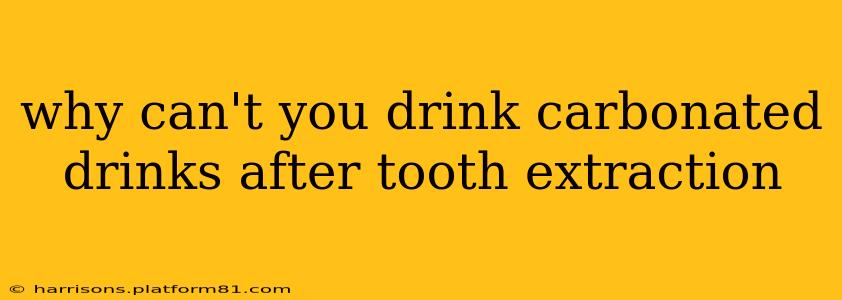Having a tooth extracted can be a bit of a rough experience, and the recovery process requires careful attention to your diet and overall health. One common question many patients have is why they can't drink carbonated beverages after the procedure. The simple answer is that the carbonation, pressure, and sometimes the acidity, can significantly hinder healing and increase the risk of complications. Let's explore the reasons in detail.
What Happens During Tooth Extraction?
Before we delve into the restrictions on carbonated drinks, it’s helpful to understand what happens during a tooth extraction. The procedure involves removing a tooth from its socket in the jawbone. This creates a wound, a blood clot is crucial for the healing process. This clot acts as a protective barrier, preventing infection and promoting the formation of new bone and tissue. Disrupting this clot can lead to serious problems.
Why Carbonation Is a Problem After Tooth Extraction?
The bubbling action of carbonated drinks creates pressure. This pressure can dislodge the crucial blood clot that forms in the extraction site. If the clot is dislodged, it can lead to a condition called dry socket, which is excruciatingly painful and significantly slows down the healing process.
Dry Socket (Alveolar Osteitis):
Dry socket is a painful complication that can occur after tooth extraction. It happens when the blood clot that normally forms in the extraction site becomes dislodged or dissolves prematurely, exposing the underlying bone and nerves. This causes intense pain, a bad taste in the mouth, and sometimes a visible empty socket. Carbonated drinks, due to the pressure from the bubbles, significantly increase the risk of developing dry socket.
What Other Drinks Should Be Avoided?
Besides carbonated drinks, it's generally recommended to avoid:
- Drinks with straws: Sucking through a straw creates suction, which can also dislodge the blood clot.
- Hot drinks: These can increase bleeding and discomfort.
- Alcoholic beverages: Alcohol can thin the blood and increase bleeding.
- Acidic drinks: The acidity can irritate the extraction site and delay healing. This includes things like orange juice and some sodas, even if they aren’t carbonated.
What Can I Drink After Tooth Extraction?
After a tooth extraction, it’s best to stick to cool, non-carbonated, non-acidic liquids like:
- Water: The best choice for hydration and cleaning.
- Milk: Provides calcium for bone healing.
- Clear broths: Easy on the stomach and provide some electrolytes.
- Herbal tea (cooled): Avoid anything too hot.
How Long Should I Avoid Carbonated Drinks?
It's generally advisable to avoid carbonated drinks for at least a week, and ideally longer, following a tooth extraction. Your dentist will give you specific instructions tailored to your individual situation and healing process. Always follow their recommendations carefully.
What if I Accidentally Drink a Carbonated Drink?
If you accidentally ingest a carbonated drink after a tooth extraction, don't panic. However, rinse your mouth gently with saltwater and contact your dentist to monitor the situation. Early detection of any problems is crucial for preventing complications.
Can Carbonated Drinks Affect Other Oral Procedures?
While the risk is highest after tooth extractions, it's prudent to avoid carbonated drinks after other significant oral procedures such as gum surgery or implant placement. The principle remains the same: the pressure and potentially the acidity can disrupt healing.
By understanding the reasons behind the restrictions, you can actively participate in your recovery and ensure a smooth healing process. Always follow your dentist's post-operative instructions carefully. If you have any concerns, don't hesitate to reach out to them for clarification.
